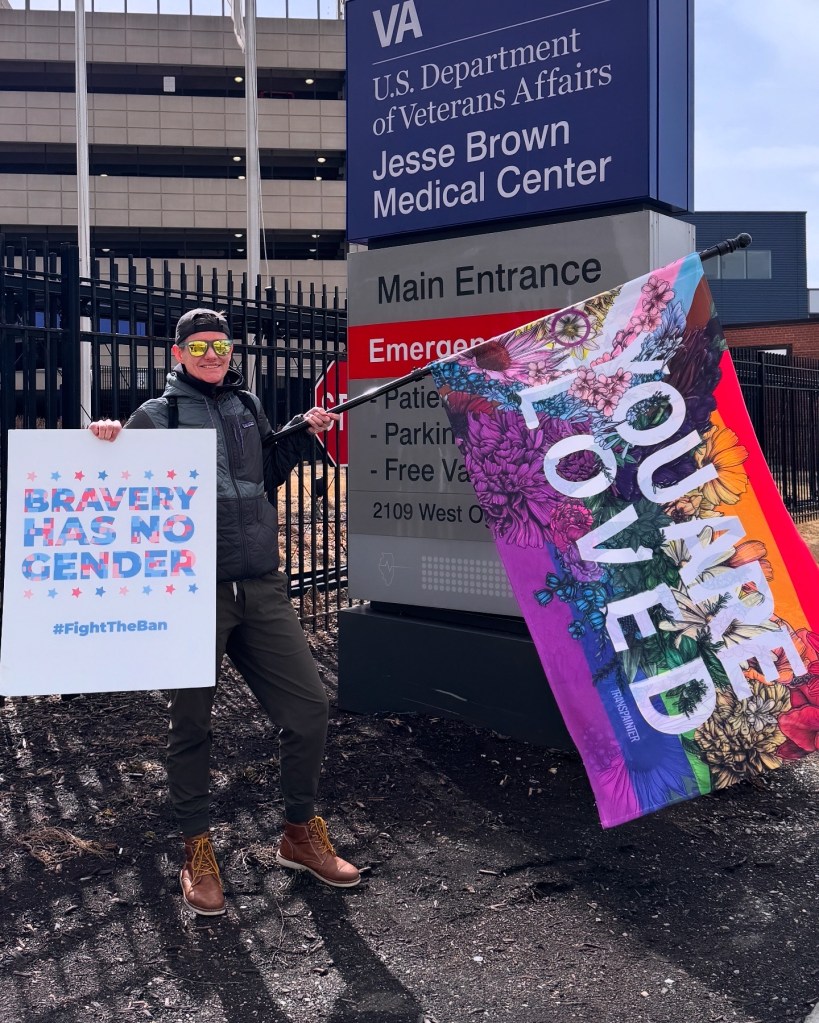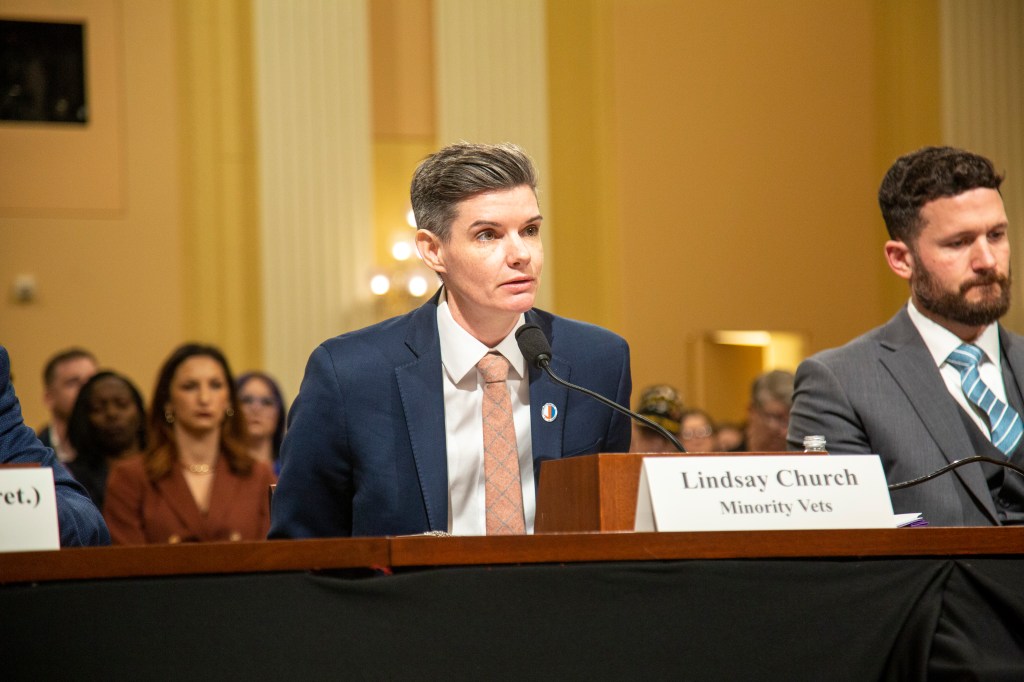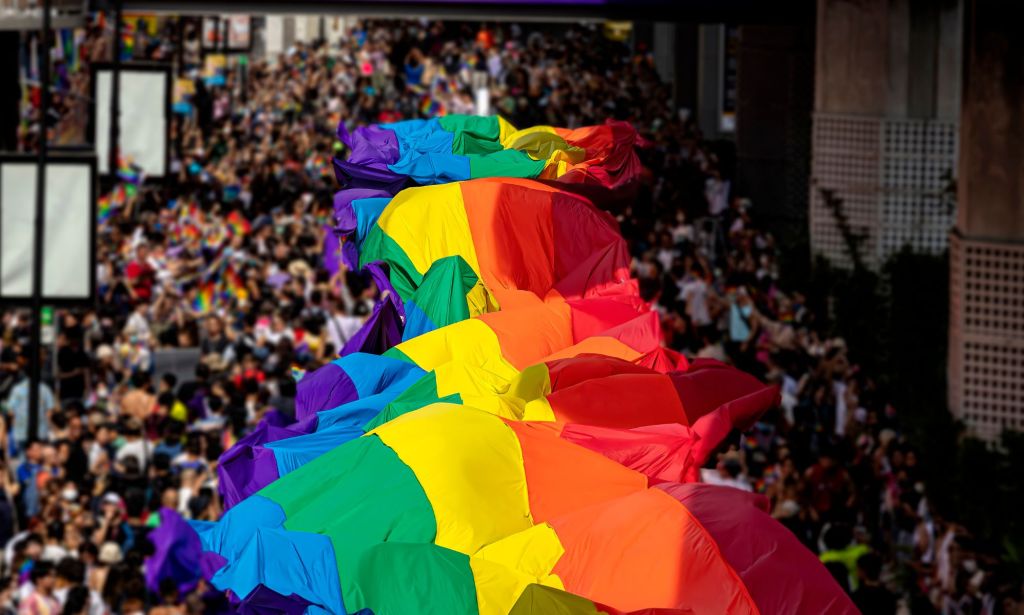Michigan state Sen. Jeremy Moss faced two traumatic incidents last fall, just months into his run for U.S. House of Representatives. But the 11-year veteran of the Michigan Legislature remains undeterred in the face of adversity, just as the queer and trans community continues to push forward and resist the scourge of Trumpism.
Moss spoke with LGBTQ Nation three months after sustaining a severely broken arm (“shattered”) when his Jeep ran into a minivan that was driving through a red light as he entered an intersection.
“I didn’t lose consciousness,” Moss told LGBTQ Nation. “I didn’t hit my head. I remember the whole thing. I tried to slam on my brakes, and I was honking my horn, and I think having my arm there on impact, both the impact of the crash and the airbag going off, is what broke my arm.”
With time and physical therapy, Moss’s arm is expected to make a full recovery. And while Moss can chalk up that bad experience to random bad luck, being the target of a bomb threat surely was no accident.
It occurred the day after Charlie Kirk’s assassination and at a time when Moss was receiving a lot of hate on social media and in messages to his office for refusing to take up a House-passed bathroom bill in the state’s Senate. The threat came by email to the municipal government office, and the police immediately alerted Moss. The bomb squad came, along with the fire department and EMT.
“The bomb was allegedly in the mailbox,” Moss said, “so they X-rayed the mailbox; they brought a bomb sniffing dog to kind of go through areas of my property. It was definitely an out-of-body experience, and it certainly was the alarm that a bomb could go off. It was also the alarm that somebody wanted to let me know that they could come after me, that they chose me, chose my name, looked up my address, and went to the effort to alarm me, my neighbors, and my community. I’ve never talked about this, so I’m really glad you’re asking.”
No motive was stated by the perpetrator of what turned out to be a false alarm.
“The sad reality is that because I’m in so many of these consequential fights, I didn’t even know what the motive was. It could have been a whole list of things that I’ve been passionate about and out front on.”
While Moss said it made him increase his personal protection and be more aware of his surroundings, the incident did not deter him.
“I obviously have risen to the level that somebody or some people want to diminish the things that I’m doing and using violent threats to do so, but also that I’m on the right track, that I’m making a difference, that I’m provoking in the right way, to push forward on freedom and rights.”
Referring to this period in history as an era of chaos, Moss reflected on the harrowing scene. “I really want to figure out, how do we get to the other side of this? And what can we do to restore some of the normal functions of our political system rather than this abnormality of hot, heated, violent rhetoric and actions?”
A lifelong resident of Oakland County, Moss attended a Jewish day school followed by public high school, before studying journalism and political science at Michigan State University. He graduated in 2008 and three years later was elected to the Southfield City Council, where he was its youngest member.
Ten months after Moss announced his run for Congress, he is outpacing his Democratic primary opponents when it comes to endorsements and dollars. While end-of-year figures aren’t yet available, at the end of last quarter Moss’s campaign had $471,912 cash on hand, comfortably leading his closest Democratic opponent. Moss is an LGBTQ Victory Fund Endorsed Candidate, and has the backing of Michigan’s top Democratic executives: Gov. Gretchen Whitmer, Secretary of State Jocelyn Benson, and lesbian Attorney General Dana Nessel.
When Democratic Congresswoman Haley Stevens vacated the seat to run for the U.S. Senate, Moss was the first to enter the race. He faces five Democratic primary opponents in this reliably blue district.
“I think I’ve been able to build the biggest coalition here from the grassroots to the governor,” Moss told LGBTQ Nation, “and I think that has a lot to do with trust that constituents have already placed in me to to wage these big battles from our economy to our democracy in the state legislature that I would bring with me to Congress.”
At 39, Moss also emphasized his “energy and youth.” He would be the youngest member of Michigan’s congressional delegation. Moss would also be the first out member of Congress from the state.
CD11 is located within southeast Michigan’s Oakland County, a racially diverse area with a significant white majority (67.9 percent). The district is also socioeconomically and ethnically diverse and is home to adherents of numerous faiths.
“This is a strong district that is multicultural,” Moss said. “People benefit from it in this district.”
Moss has long been an advocate for LGBTQ+ causes in and out of the Legislature. As senator, he introduced the amendment to Michigan’s civil rights law that would include queer people, a momentous occasion for LGBTQ+ Michiganders. It was the culmination of a 40+ year battle in this purple state, as activists and legislators passed the baton year after year. Moss said he felt like the final runner who crossed the tape and that he felt “the weight of that history.”
“I very much felt the weight of all of the people from Ruth Ellis to Jeff Montgomery—all of these people who have made such a huge mark on the advancement of LGBTQ rights, I carried all of them with me.”
Defending marriage equality is a high priority for Moss. In November, he introduced a resolution in the Senate to put a proposal on the ballot to remove Michigan’s constitutional ban on same sex marriage.
Prior to that, after Republicans took back the majority in the state House at the beginning of last year, one of the first actions taken by the far-right coalition was to introduce a nonbinding resolution to overturn Obergefell v. Hodges and re-ban equal marriage.
One particularly ignoble Republican representative took the additional step of holding a press conference where he spoke for five minutes, refused questions, “and then, when he scurried away from the podium,” Moss said, “I took over the podium to give an immediate rebuttal to the bulls**t that he spewed.”
“Buffoonish” is how Moss described the Republican’s performance at the time.
LGBTQ+ policy is just one area of focus for the state senator, who has also been a champion for voting rights, government transparency, and ending gun violence throughout his tenure in the state legislature.
Chair of the Elections and Ethics Committee, Moss called voting rights “a driver for me.”
“I really believe you have to make sure the foundation is strong before you can build anything on it, specifically with voting rights,” Moss said. “Voting rights secure all other rights.”
“I was tasked with implementing the voter-passed proposal from 2022,” Moss said. “We wrote the law that implemented nine days of early voting that expanded access to absentee ballots, and many pro-voter initiatives. And in the face of MAGA extremism trying to sow doubt in our election systems, we have made our election systems even stronger and debunked all of these conspiracy theories.”
The piece of legislation Moss is most eager to champion in Congress is the John Lewis Voting Rights Act. “I want to take this experience that I’ve accumulated as a voting rights champion in the [state] legislature and bring it federally as well.”
Moss, who is active in Jewish life in Michigan’s 11th Congressional District, recalled the point at which he became aware that even today, many people in this country still hate and scapegoat Jews.
“For the first 30 years of my life, antisemitism was in history books and black and white pictures and old film reels,” Moss said. “It was something that my grandparents and parents told me about.”
“I think starting with Charlottesville, it really took life in real color in real time. And obviously, it started as things we can tangibly understand: neo-Nazis, far right activism, tiki torches at Charlottesville, and now it has uncomfortably crept into the far left as well. And so, extremism is never good for the Jews.”
Violent incidents like those in Charlottesville and at a recent Hanukkah celebration in Sydney are becoming increasingly common, and “the worst part of it is the lack of surprise that these incidents are becoming more and more frequent,” Moss said.
“We need to all gather together to snuff out this horrible, untenable rise in antisemitism,” Moss said, “and there’s a robust Jewish community here in this district that is looking for that representation as well.”
Moss said he often talks with Nessel about hate and violence here and abroad. “We’ve applied all of the fighting spirit that we’ve accrued through LGBTQ activism, and we’ve put that into our fight against antisemitism,” Moss said. “Taking on hate doesn’t require rewriting the playbook.”
While the war in Gaza has been playing out thousands of miles away, Moss pointed out that it’s impacted Jews locally. “We saw the Jewish Federation building be vandalized on the anniversary of October 7th. We’ve seen other public Jewish officials be targeted at their work and at their home with vandalism and graffiti. It’s been very, very challenging here to navigate through that.”
At a time when elected officials are increasingly scrutinized over their ties to Israel, Moss says he is well aware of the heightened rhetoric.
“I think that my views are right in the mainstream of this district,” Moss said. The district has been represented by Stevens, a moderate, since 2022.
“I think that the framework of this, the ceasefire, right now is incredibly important. The hostages have been released. The Israeli military campaign has receded back. The rush of humanitarian aid has to go where it’s needed, to Palestinian civilians, and I support all of those negotiated items.”
“In this time of a five-alarm fire,” Moss said he thought it was important that the Jewish community “has a voice in the places where it matters.”
While Moss is balancing his time between campaigning and finishing his term as Senate President pro tem, he still finds time for his favorite pursuits: travel and live music. And that often involves Patti LaBelle in concert.
“I think when you’re gay you get assigned one diva at birth, and then you have to roll with that person, ride or die for the rest of your life,” Moss said. “Mine just happens to be Patti LaBelle.”
Moss explained that he grew up listening to Motown and R&B, and was already a fan of LaBelle when he and a friend were on vacation in Chicago and saw that she was headlining a Pride festival in Milwaukee, about an hour north. “Years and years before marriage equality,” Moss noted. So they headed for Wisconsin.
“At the end of her concert as she’s walking off to this big acclaim and this rousing ovation,” Moss began, “she points to the audience, and she says, ‘Stay gay.’ And it was kind of that first moment where it’s like, OK, being gay isn’t something to run away from or deal with or endure or overcome. This is somebody telling the audience, no you stay gay. You are in the right place, at the right time, and you should keep doing it.”


